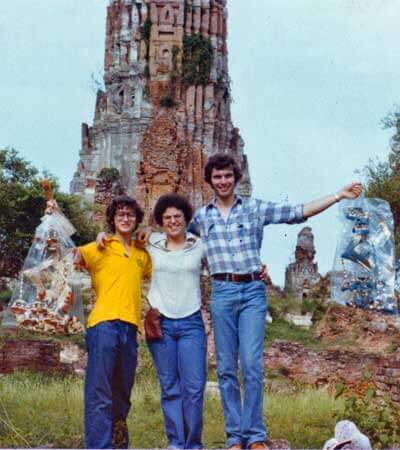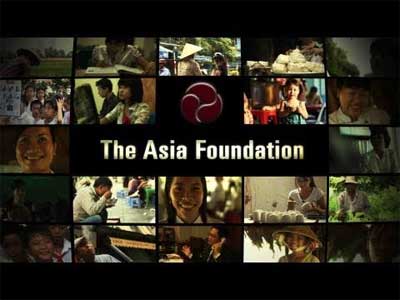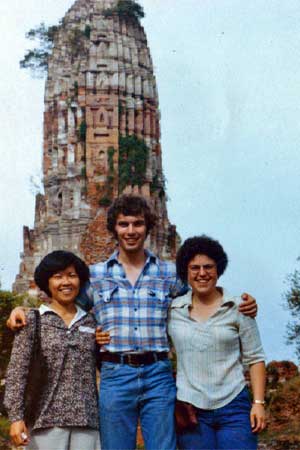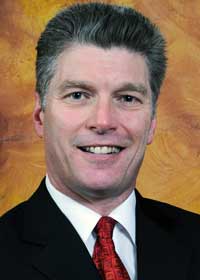
John Brandon (right) visits Ayudtaya in Thailand in June 1978 with Julia Lamb (center), research associate and outreach coordinator for the NIU Center for Southeast Asian Studies, and Frank Silverstein. Brandon and Lamb met at Drew University and have remained good friends since. Silverstein, whose father, Josef, was a prominent Burma specialist in his day, was born in Burma and had lived about half his life in Southeast Asia when the photo was taken.
Can a few lines on a scuffed up scrap of paper really hold the key to changing your life?
Yes, they can, says NIU alumnus John Brandon, but only if you remain open to the opportunities they might present.
While attending Drew University, Brandon picked up a flyer for the “Princeton in Asia” program, which offered undergraduate students the opportunity to live and teach in Asian countries. That simple act changed his life.
“I was a senior in college, majoring in history, and I had no background in Southeast Asian culture, Asian affairs or international relations in general,” he says. “I found this piece of paper on the floor in one of the classrooms where I was going to school – not Princeton, by the way – and it talked about being a teacher-ambassador at an unpronounceable university in Thailand. I applied, but my expectations were low.”
The interview went well, but Brandon figured he wouldn’t be picked for the program.
He was right.
The committee picked three finalists and two alternates. Brandon was the first alternate –until a month later, when he one of the students dropped out of the program, clearing the way for him to participate.
“Had I not found that piece of paper, had one of the finalists not dropped out, I’m sure my life would be very different,” he says.
“I would not have gone to Thailand, I would not have studied with the NIU Center for Southeast Asian Studies and I surely would not have been working for the Asia Foundation, as I have for the past 21 years. My experience at NIU gave me the grounding in and understanding of foreign policy – and in particular U.S. foreign policy in Southeast Asia – that has helped me be successful.”
Brandon grew up in a middle-class, melting pot of a neighborhood in New Jersey and had never been further west than Hershey, Penn., when he decided to teach in Thailand.
“I went to Asia with little to no training in the language or the culture,” he says. “It was not easy. But the Thai people were very warm and ingratiating; I still keep in touch with the woman who was my next door neighbor there. She is now 95 years old.”
Brandon also developed a strong bond with the students in his classes; like him, they were the first in their families to attend college. This shared desire for education and the common bond of supportive family helped bridge their cultural differences.
He stayed in Thailand for three years. When he returned to the United States, he could speak the language fairly well, but couldn’t read or write it. So, he began looking for a program that would allow him to study the region and the language in more depth.
“When I was exploring my options, I called Professor Clark Neher, who was then chairman of the political science department at NIU, and I asked if he would discuss the program with me. I had already spoken with professors from other universities, and they had not been very generous with their time,” Brandon says.
“But when I introduced myself to Professor Neher, he told his assistant to shut the door, that he was speaking with a prospective student and didn’t want to be interrupted. That personal touch indicated to me that there were professors and staff in this program who genuinely cared about their students. Over the last three decades, that has not changed – the way the center cares for its students has always remained constant.”
As a result of that personal touch, Brandon came to NIU on a Foreign Language Area Studies scholarship and studied Thai.
While at NIU, he not only completed a master’s degree in political science and Southeast Asian studies, but he also met his future wife, Maureen, who was finishing her master’s degree in anthropology. They have three children, Matthew, Christopher and Lauren.
 Today, Brandon is the director of International Relations Programs for the Asia Foundation, a nonprofit organization supporting leadership, economic, and institutional development; student exchanges; and policy research related to the Asia-Pacific region. He also serves as associate director of its Washington, D.C., office, which is one of two offices in the United States and 17 scattered throughout Southeast Asia.
Today, Brandon is the director of International Relations Programs for the Asia Foundation, a nonprofit organization supporting leadership, economic, and institutional development; student exchanges; and policy research related to the Asia-Pacific region. He also serves as associate director of its Washington, D.C., office, which is one of two offices in the United States and 17 scattered throughout Southeast Asia.
He typically travels between 90 and100 days each year and coordinates a number of programs, including a monthly Southeast Asia Roundtable, which brings U.S. and Asian diplomatic communities together with Southeast Asian specialists to discuss important issues.
Brandon returned to NIU this past spring to help kick off the 50th anniversary celebration of the Center for Southeast Asian Studies.
The year-long series of events will culminate with an alumni event Friday, March 1, 2013, followed by a gala dinner and cultural performances on Saturday, March 2, 2013. Brandon is co-chairing the festivities along with his mentor, Neher, now faculty emeritus.
“I’ve always enjoyed coming back to NIU,” Brandon says. “It’s great to see old friends, to meet new ones, to talk with graduate students and learn what’s on their minds. As we celebrate the 50th anniversary of the founding of the NIU Center for Southeast Asian Studies and I think of the people who have studied at the center and graduated from here in various disciplines, I feel very honored to be co-chair.”
 Brandon’s work with the Asia Foundation is unique in that it not only encompasses economic development of the region and improvement of U.S-Asian relations, it also focuses on strengthening relations among Asian countries. The foundation encourages regional cooperation on issues that transcend national boundaries, such as human rights issues, environmental concerns, and emergency assistance.
Brandon’s work with the Asia Foundation is unique in that it not only encompasses economic development of the region and improvement of U.S-Asian relations, it also focuses on strengthening relations among Asian countries. The foundation encourages regional cooperation on issues that transcend national boundaries, such as human rights issues, environmental concerns, and emergency assistance.
He acknowledges that the Vietnam conflict “left a very bitter taste in America’s mouth,” resulting in an attitude of benign neglect toward the region.
Events after Sept. 11 made many in the United States view the region as a haven for terrorists and radical Islamists. Brandon cautions to not view the region “through the unidimensional prism of counterterrorism” but rather to consider the importance of this region from a global perspective.
About 35 percent of all world trade passes through the region’s Straits of Malacca; it is also a key energy link for China, Japan and South Korea, with about 15 times more oil passing through the Straits than through the Panama Canal and three times more oil than through the Suez Canal. Brandon also notes that this sea line of trade, energy and communications supports more than 440,000 jobs in the United States.
He says the “people-to-people” ties are as equally important as economic and security issues, citing the Fulbright exchange programs that allow Southeast Asian scholars to study in the United States and vice versa. “Almost every faculty member affiliated with the NIU Center for Southeast Asian Studies has had some type of Fulbright during their career,” he says.
Brandon’s advice for students, including those who wish to follow his career path is simple: Passion and persistence are keys for success in any field.
“If you have a passion for Southeast Asia or really for any region, that’s critical. If you don’t, do something else,” he says. “You also need to be persistent, always looking for ways to expand your network. If you’re not interviewing for a job and you’re talking with someone, ask them for the names of one or two individuals you should contact. Something may develop from those contacts. Expand your network, be persistent, have fortitude and have passion. Those are the things that are most important.”
by Deborah Fransen

